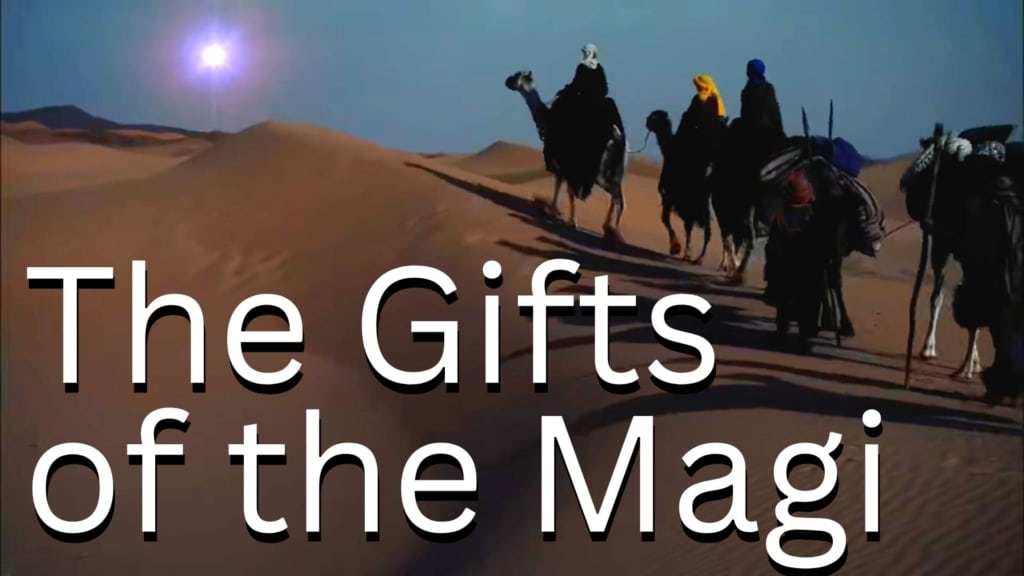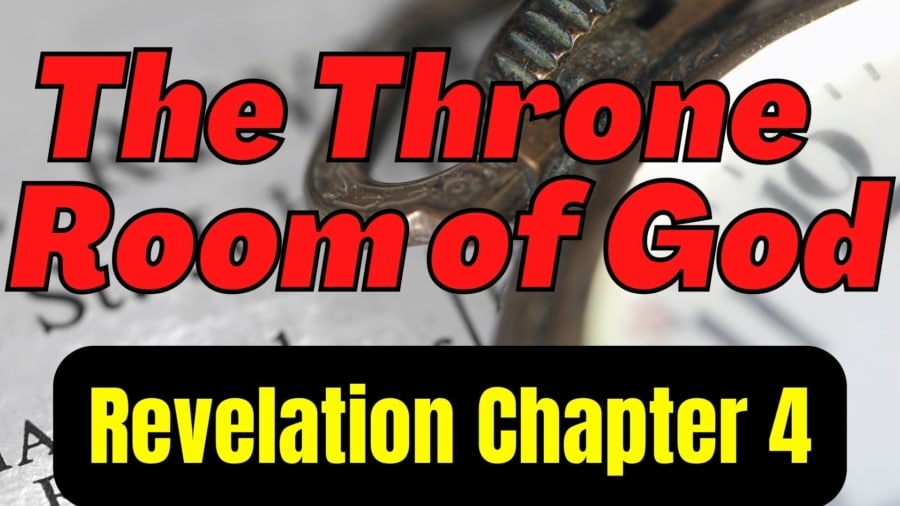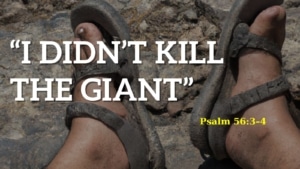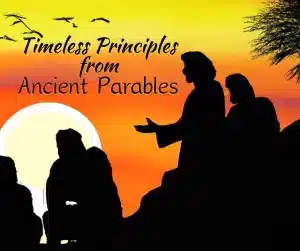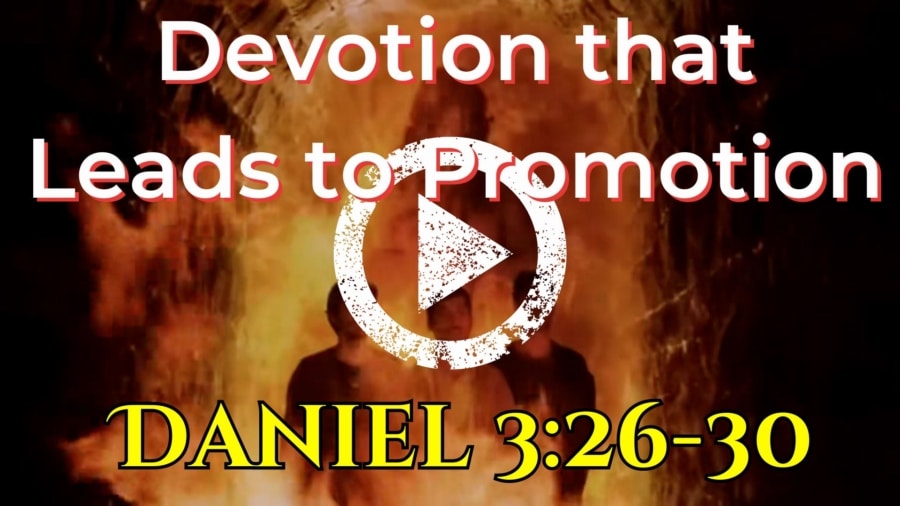It’s Christmas time again—the time when we commemorate the birth of our Lord with celebration and the giving of gifts. Matthew 2 gives us the account of the Magi that visited Jesus as a baby; opened up their treasures and gave Him the gifts of gold, frankincense, and myrrh. The Magi, or wise men, came from the east. The east, at the time of Christ, was Media, Persia, Babylonia, and Assyria. They followed the directional star until it stopped in Jerusalem. There was something very unique and special about this star because the wise man called it His star. When they arrived in Jerusalem, they inquired at the court of Herod, “Where is He who is born king of the Jews?” Herod did not know. So, he gathered together the religious leaders of the day and asked them “the question.” They answered with a prophecy from Micah 5, stating that out of Bethlehem would come the Ruler and Shepherd of Israel. Now as the Magi departed for Bethlehem, the star once again appeared to lead them to the house of the Christ Child. There are many misconceptions about the Magi. They were not present at the Nativity. They arrived sometime later when Joseph, Mary, and their son Jesus have now moved into a home in Bethlehem.
We always picture three Magi, but that number is not given in Scripture. There could have been a large entourage of them pulling up to the house on their camels. But what we do know for certain is that they came bearing the gifts of gold, frankincense, and myrrh for Baby Jesus. Before the Magi presented gifts, they fell down and worshiped the Christ Child. These are wise, wealthy, and important men. Yet they could not remain standing in the presence of Jesus Christ. Instead, they fell down. They prostrated themselves at the feet of this baby in total adoration and worship. The first gift these men gave the Christ Child was their heart. And we, like the Jews of old, are to “love the Lord our God with all of our heart, all of our soul, and all of our might.” Jesus died on the cross not to redeem our body—our body is temporary; our body will pass. Jesus died on the cross to redeem our eternal soul—our heart. And when we give Jesus all of our heart, it is a precious gift in His sight.
Wouldn’t it have been amazing to be a part of that journey: to follow the star, to arrive at the house, to behold the Young King, to fall down and worship Him, to give the gifts of gold, frankincense, and myrrh. We aren’t able, like the wise men, to bow before the cradle of Jesus. But we can, in a spiritual sense, bow before His throne and present to Him the gifts of gold, frankincense, and myrrh. Before we look at the significance of these gifts, I want you to understand that the gifts the Magi gave were quite valuable. If you and I were living in that day, we may not have been able to afford the price of these gifts. But the gifts we now present to Jesus are of a spiritual nature. And by His grace, we have been given all spiritual blessings and riches in Christ Jesus. We can only afford to give back these gifts because of the spiritual riches that Christ first gave to us.
GOLD
The first gift the Magi gave Jesus was gold. Gold is the metal of kings. When the Queen of Sheba visited King Solomon, she presented him with a large amount of gold. Gold is mentioned 385 times in the Bible as an emblem of wealth and an emblem of royalty. In the giving of gold, the Magi recognized Jesus as King. They believed Him to be the God-King, the King of all Kings, the King of the Universe, a child, but a King.
Revelation 19:16, “And on His robe and on His thigh, He has a name written,
‘KING OF KINGS AND LORD OF LORDS’”.
How can we, like the Magi, present our King Jesus with the precious gift of gold? By facing the various trials of our life in faith.
1 Peter 1:6–7, “In this you greatly rejoice, even though now, for a little while, if necessary,
you have been distressed by various trials, that the proof of your faith,
being more precious than gold which is perishable, even though tested by fire,
may be found to result in praise and glory and honor at the revelation of Jesus Christ.”
Just as gold is refined by fire, our faith is refined and purified by the trials of life. We don’t like those trials, but they prove our faith and proven faith is more precious than gold to our Lord. In these verses tell us it is necessary to go through trials and it is necessary to be distressed in this life. The word for distress means to grieve and heaviness, to be thrown into sorrow. Can you relate to these words? Trial testing, grief, heaviness, sorrow? I have been through times of heaviness and deep sorrow in my life. And during these times I felt the most distant from God. And during these times, I have felt the most intimate with God. What drew the line between distance and intimacy? My faith. When I balked at the trial—resented it, my heart was hard and distant from the Lord. When I surrendered to the trial in faith, my heart softened and my relationship with the Lord became very intimate. We know His presence best in times of trial.
Isaiah 48:10, “I have tested you in the furnace of affliction.”
Proverbs 17:3, “The refining pot is for silver and the furnace for gold,
but the Lord tests hearts.”
A purified heart is like gold, a precious gift to our Lord.
FRANKINCENSE
The next gift the wise men presented from their treasures was frankincense. This, too, is a highly prized and valuable gift. Frankincense is an aromatic gum resin scraped from the bark of trees native to the Middle East and Africa. When frankincense is burned, it creates a strong aroma, and it’s associated with the priesthood. Frankincense was burned at the altar of incense in the tabernacle as a picture of Jesus Christ, the sweet-smelling aroma of God. The location of the altar of incense within the tabernacle is significant. It was placed right in front of the veil that separated the holy place from the Holy of Holies—the Holy of Holies being the abiding place of God’s glory. In the giving of frankincense, the Magi recognized Jesus as High Priest. And Jesus Christ is our High Priest and the only mediator between God and man. As our faithful High Priest, Jesus daily sits at God’s throne making intercession for us.
Hebrews 7:25, “Hence also He is able to save in every way those who draw near to God through Him,
since He always lives to make intercession for them.”
When Jesus died on the cross, the veil separating the holy place from the Holy of Holies was torn from the top to the bottom, signifying we now have free entrance to the throne of God’s grace. As our High Priest, Christ welcomes us to come boldly before Him in prayer.
Hebrews 4:14–16, “Therefore, since we have a great high priest who has passed through the heavens,
Jesus the Son of God, let us hold fast our confession.
For we do not have a high priest who cannot sympathize with our weaknesses,
but One who has been tempted in all things as we are, yet without sin.
Let us therefore draw near with confidence to the throne of grace,
that we may receive mercy and find grace to help in time of need.”
In Jesus, we have a faithful high priest who totally understands our weaknesses, our tests and trials, our pains and problems. And He has thrown open the doors of God’s throne to us. So how can we, like the Magi, present Jesus, our High Priest, with the aromatic gift of frankincense? By bowing before Him with a prayerful heart. The connection between prayer and incense—frankincense—is found in Psalm 141:2,
“Let my prayer be set before you as incense.
The lifting up of my hands as the evening sacrifice.”
Revelation also speaks of the prayers of the saints as incense before God’s throne.
Revelation 5:8 “When He had taken the book, the four living creatures and the twenty-four elders fell down before the Lamb,
each one holding a harp and golden bowls full of incense, which are the prayers of the saints.”
The altar of incense in eternity is the lifting up of our prayers and time. Every single prayer that we pray in time is there in eternity, burning as a sweet-smelling aroma to God. How precious is a single prayer to Him. In the tabernacle, the altar of incense was before the veil. In eternity, the altar of incense is before the throne. In the church age, the altar of incense is in our heart. The altar of incense in the tabernacle was to burn continually. And what does Paul tell us in 1 Thessalonians 5:17? “Pray without ceasing.” Keep the altar of incense in your soul burning day and night. A prayerful heart is like incense—a precious gift to our Lord.
MYRRH
The third and last gift the wise men pulled from their treasure chest was the gift of myrrh. Myrrh is also a fragrant spice from the sap of a tree. It has been used over the centuries for many different things, but in the time of Jesus, it was most often used for embalming the dead. Myrrh gave off its greatest scent when it was crushed.
John 19:39–40, “And Nicodemus came also, who had first come to Him by night,
bringing a mixture of myrrh and aloes, about 100 pounds weight.”
And so, they took the body of Jesus and bound it in linen wrappings with the spices, as is the burial custom of the Jews. In the giving of the myrrh, the wise men recognized Jesus as the long-awaited Messiah. They recognized Him as the Lamb of God that takes away the sin of the world. Jesus was born to die. When we were born into this world. no one gifted us with myrrh. I’m quite sure we were given the usual baby gifts—blankets, sleepers, diapers, and rattles because no one thought that we were born to die. But when, at the age of 17, I put my faith in Jesus Christ, I was reborn. I was born from above. I was born of God. And in my spiritual birth, I was born to die. And so were you.
How can we, like the Magi, present our Lord and Savior with the gift of myrrh? By bowing before Him with a sacrificial heart.
Romans 12:1, “Therefore I urge you, brethren, by the mercies of God,
to present your bodies a living and holy sacrifice,
acceptable to God, which is your spiritual service of worship.”
Galatians 2:20, “I have been crucified with Christ;
and it is no longer I who live, but Christ lives in me;
and the life which I now live in the flesh I live by faith in the Son of God,
who loved me and gave Himself for me.”
Jesus said to His disciples in Luke 9:23,
“If anyone wishes to come after Me,
let him deny himself and take up his cross daily and follow Me.
For whoever wishes to save his life shall lose it,
but whoever loses his life, for My sake, he is the one who will save it.”
In my years of living on this earth as a child of God, He has blessed me with the honor of meeting many sacrificial hearts. We have served with Wycliffe translators in Papua New Guinea—a husband and wife that devoted their lives to reaching a remote language group with the Gospel of Jesus Christ. They were dropped into a primitive village, in their mid-twenties, with six months’ supply of food, a radio, and a fire for lost souls burning in their heart. Because of their lifelong sacrifice, there are now thousands of believers in that remote people group. We have been in underground churches in China, Burma, and Vietnam, where pastors and believers sacrifice their safety for the privilege of meeting together, where they have been imprisoned or are willing to be imprisoned for the sake of the Gospel. We have met men and women that carry their body, the scars of persecution—these are sacrificial hearts. Sacrifice comes in large life, defining packages like these. But also, in small incremental packages. It may be sacrificing a peaceful evening to help a friend in need, to answer that phone call at the most inconvenient time to counsel or comfort someone that needs it. The issue is not to compare one believer’s sacrifice with another’s. The issue is to be willing, in our walk with Christ, to sacrifice in the way that He asks us to sacrifice. Your cross as your cross, and my cross is my cross. And that will look different for each of us.
It would have been such a glorious experience to live in the days of the Magi—to follow the star to a humble home in Bethlehem, to enter with the wise men and bow before Baby Jesus, to worship him and present Him with the gifts of gold, frankincense, and myrrh. But how much more glorious to come before Him now with the spiritual gifts of gold, frankincense, and myrrh—a purified heart of gold, a prayerful heart of incense, a sacrificial heart of myrrh, all by his grace and all for His glory. Christina Rossetti said it like this,
What can I offer, poor as I am?
If I were a shepherd, I would bring him a lamb.
If I were a wise man, I would do my part.
But what can I give him? I give him my heart.
We wish you all a very merry Christmas as you bow before the throne of Jesus, and love, praise and adoration.
Merry Christmas to you all.


